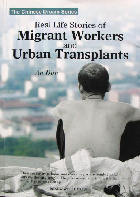Struggling for a Better Life
Struggling for a Better Life
By staff reporter ZHANG HUI
 |
Real Life Stories of Migrant Workers and Urban Transplants
Author: An Dun
Hardcover: 221 pages
Publisher: New World Press
RMB 48.00
IN recent years it's been the case that any major event in China makes big international news, whether good – like its heartening growth – or bad, such as food contamination scandals. The world media also systematically chases the expanding class of nouveau riche, sports heroes and entertainment stars in the nation. Yet scant talk is heard of the less exciting stories about China's average Joe or Jane, how they get by day to day coping with all the uncertainty, promise and stress of a society in flux. To add the missing piece to the China puzzle, the New World Press released Real Life Stories of Migrant Workers and Urban Transplants, part of the series One Hundred Chinese People's Dreams. The book is a collection of ten warts-and-all narrations by selected migrant workers. They represent the most vulnerable group in the country, clustered far from their rural hometowns in big cities, and subjected to poor working conditions, late paychecks, and intermittent employment.
Each story is told in the teller's own voice; the author's rendering highlighting their personal and individual humanity. An Dun only supplements their narration, confined to brief comments and background information at the conclusion of each monologue.
Migrant workers account for over half the population in many of China's metropolises such as Beijing and Shanghai. Without a local hukou, or permanent residency permit, they are stripped of many benefits and conveniences associated with that status, and simply have to struggle harder to achieve a decent, dignified life in the big bad underbellies of urban settings. Some succeed, but the majority are trapped in limbo on the fringes of society. As one narrator, casual laborer Zhou Shuheng, put it: "Recalling now all the details of my life as a migrant worker, I realize that life is naturally very difficult for most people who walk this path. But few have paid any attention to us. We have endured so much, but what have we got for it?"
Despite the deep bitterness toward the perceived unfairness to their kind, more migrant workers are joining the corps on the road. As for their ambivalence toward the urban jungle, An Dun gives this terse explanation: "They come to seek a better life." She introduces readers to the specific notions of a "better life" held by the ten people she interviewed. They vary wildly, but can all be boiled down to affluence for themselves and their loved ones, the predominant desire of all human beings. In the case of Cao Yulan, the motivation to navigate poorly-paid odd jobs far from home is simply to keep her brother and sister in school, an obligation rather than a burden for her; and this is true for her peers in the same circumstances.
Against the stereotype, ten interviewees in this book include not only rural laborers but also college graduates and people from small towns and cities. Today the term "migrant worker" is no longer confined to former farmhands with little education who toil on construction sites or peddle vegetables in the street. Young people from less developed regions who have degrees and ambition may also head where streets are reputedly "paved with gold." Their higher education and better skills place them in a better position than the old-type migrant, but they are still disadvantaged compared to locals. Du Jing, a college graduate from Shanxi Province, chose to make a living in Tianjin. Despite her high competence as an English teacher, her goal to start an English training class met many obstacles, just because she was a non-native. A local public kindergarten demanded an unreasonable fee for her use of their classroom, and a landlord intentionally increased the rent without any justification, out of jealousy that she would be making money by teaching students in the apartment.
The demographic shift that produced the category "migrant worker" goes with a shift in expectations and aspirations. Besides money, they also long for recognition, community and spiritual gratification. This is true of all people at all educational levels and from all origins, town or countryside. Zhou Shuheng is such an example. Poverty compelled him to drop out of high school and join the labor force. Over 13 years, he hopped from one odd job to another in Fuzhou, Fujian Province, learning first hand the exceptional hardship and prejudice facing the country folk toiling in cities. He later rounded up his impressions and wrote them into a novel called Chinese Migrant Workers, which immediately received widespread public attention.
Formerly a journalist with Beijing Youth Daily, An Dun first earned herself a Chinese fan base with her 1998 bestseller Absolute Privacy, which established her style of "telling real stories," or having her interviewees fashion the narrative as they liked. On explaining her interest in "small potatoes," she said: "I had many interviews with the celebs when working for the newspaper. During our conversations I often felt alienated from them. In that rank and file you rarely hear a spontaneous and authentic revelation: different people said the same 'canned' thing on different occasions. What these average people have to say makes a lasting and moving impression. I hope my readers feel the same way about my book."
Services
Economy
- Eco-agriculture and Eco-tourism Power Nanchang’s Green Development
- Balance Environmental Protection and Economic Prosperity – Nanchang Looks to European Technology for Green Development
- Sustainable Growth Requires Wiser Energy Use
- Chinese Economy: On the Path of Scientific Development
- China's Economy over the Last Ten Years

